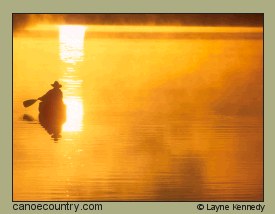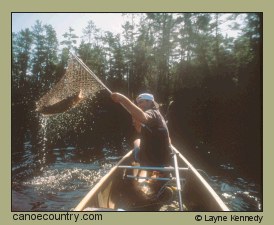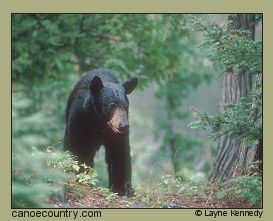|
CanoeCountry.com
Leave No Trace / Low Impact Guidelines
Ethics for travel in the Boundary Waters and Quetico Park
Plan Ahead and Prepare
You're visiting a unique and vulnerable
area. Only a thin layer of soil developed after the glaciers left the area about 11,000 years
ago. Some areas suffer from erosion caused by over usage and unwise
practices. The BWCA and Quetico Park are unique areas that need to be protected from human encroachment. With your help, we can keep this magnificence for future visitors.
Some guidelines:
- Know the regulations
and special concerns for the area you'll be visiting. Stop at the Forest Service Ranger
Station or ask your outfitter. Special situations can range from forest fire
potential, pesky black bears or severe weather. BWCA Regulations
- Visiting the BWCA
requires a permit. Groups can be NO larger
than 9 people at any time. This includes on the water, at campsites, while visiting
attractions and, yes, even at portages.
- Avoid popular areas
during high usage periods. The BWCA has a permit quota system that, in theory,
it reduces overcrowding. Visitors must enter on the authorized day and entry point stated on
the permit.
- Repackage food into reusable
containers, such as plastic bags or hard plastic containers. Leave unnecessary food
packaging, and metal and glass containers at home. Plastics are illegal to burn in
the state of Minnesota and metal and glass containers are never allowed in the
BWCA. (Metal containers are allowed for personal articles such as shaving cream.)
- Choose an established,
legal campsite (shown by a red dot on the map) while in the BWCA. In the Quetico Park you may camp anywhere. BWCA sites are furnished
with a fire grate and latrine. Before unloading equipment from the canoes, check the
availability of tent sites - if you have a large group, you may need two or three tent
pads. Look for a safe canoe landing, so you can maneuver the canoes to remove
equipment. Granite outcroppings or shorelines lined with boulders are encountered
many times more than a sandy beach. These surfaces can be very slippery.
-
Play it safe!
- Many of the injuries in the area happen when people
fall while carrying equipment. Sometimes from a heavy load or footwear that didn't hold up
to the test.
- Climbing trees can be very dangerous, or fatal. If you fall, you may not receive quick emergency care.
- Leave hatchets and axes at home. A
small saw will prove to be safer and easier to use.
- Consider using a small cook stove. If
you desire a fire to cook over, plenty of firewood may easily be found away from your
campsite. One good method for gathering wood: two people can take the saw and
canoe, and paddle to an area where dead firewood is available. Cut only
dead, downed wood that is no larger than an adult's wrist. Much of the soil in the BWCA
comes from decaying trees.
|
 |
Minimize
Use and Impact of Fires
- Campfires can cause lasting impacts
to the backcountry. In the BWCA, fires are permitted only within the provided
fire grate. Gather dead or downed firewood -- the live green stuff doesn't burn too
well. Besides, it is illegal and unethical to cut live vegetation for any reason
other than emergencies. Remove all unburned trash from the ashes before you leave.
Maintenance is everyone's job, so keep your campsite tidy!
Please contact the U.S. Forest Service 1(218)626-4300, Quetico Provincial Park 1(807)597-2735 or your outfitter if you have any questions whether or not there is an burning
ban active in the Boundary Waters or Quetico Provincial Park. ALWAYS bring your campstove(s) with, just incase.
Please note:
Large forest fires developed recently because of irresponsible campers. In 1995,
May 2007 and September 2011, forest fires damaged 80,000+ acres in and near the BWCA, sending hundreds of
visitors out early. Outfitters hoped they wouldn't lose everything they owned. With
the possible effects of El~Nino, even areas such as the Rain Forest are becoming
susceptible to fires of massive proportions. Campfires are only permitted while the
fire is being attended and it is illegal to leave a fire of any kind unattended. It's also
a good idea to have a bucket of water ready in case things get out of hand. Pay
attention and put the fire completely out before you go to sleep or leave the campsite-
it's only common sense...You will be held responsible for any damage or
expenses caused from a fire. Including the cost of fighting the fire and
any property damage.
Avoiding
Problems With
Bears and Scavengers
- Keeping your campsite free
of food scraps and litter is your best defense to avoiding unwanted visitors. Visitors
such as black bears (Minnesota only has black bears-there are no grizzly/brown bears)
can wipe out a camper's supply of food in a hurry. Bears have an incredible sense of
smell and are attracted to food and scented toiletries that we bring into the wilderness.
Food and other "smelly
stuff" should not be brought into your tent. The saying goes, "If it smells
good to you, it'll smell great to a bear!" (OK, garbage doesn't apply to
that saying, but it sounds good, right?)
"Smelly Stuff" includes
scented articles like candy, tooth paste, gum and garbage. All these articles should
be hung high in a tree at night (here's how)
or when you leave your campsite. Don't be a fool and leave your food and packs laying on
the ground during the day. Rodents have a higher incidence of causing trouble than bears do, chewing small holes in your food packs and tunneling in your gear bags.
Bears are usually frightened off by
loud noises and rock throwing. If a bear refuses to leave your campsite, move to another site, and PLEASE report the incident to the U.S. Forest Service (218)626-4300, or Quetico Provincial Park (807)597-2735. You'd be
wise to take your food packs with you if you day trip. You'll lose any kind of food left out in the open or on the ground. Stringers of fish dangling from the shore may disappear after other fish, gulls or a snapping turtles feast on
your catch.
Leave
What You Find
- Treat our natural heritage with
respect. Leave plants, rocks and historical artifacts as you find them. Please report
any findings to the regional U.S. Forest Service Office.
|
- Let nature's sounds prevail. People come to this area to escape from all the hassles and disturbances of modern life. Leave your radios and music in the car. Others do not want to hear your loud voices or music. If you want to see wildlife, we suggest keeping your eyes open
and the noise to a minimum. If you must party and cause all kind of ruckus please consider going somewhere else!
- Control pets at all times, including portages. Imagine how you
would feel running into an unfamiliar dog on a portage? Please remove any pet feces from campsites, portages or trails it is OK to place that stuff in latrines.
- Building any structures, furniture or trenches is unethical in
the BWCA and Quetico Wilderness and spoils the next visitor's impression. Many techniques that were
commonplace even 10 years ago have been eliminated or replaced with Leave-No-Trace ones.
|
 |
Properly Dispose of What
You Can't Pack Out
-
Deposit all human and pet waste in the latrine, or bury it in catholes 6 to 8 inches deep
and at least 200 feet from water sources, campsites and trails. Cover and disguise
the cathole when finished. This will allow the bacteria to break down the material,
and minimize any potential visual impact.
- Use toilet paper and wipes sparingly. Dispose of them
in the latrine or pack them out.
- To wash yourself or your dishes, carry water 200 feet away
from streams or lakes and use biodegradable soap. Scatter or spew soapy water far
back in the woods from your campsite and away from water sources. Biodegradable soap is not considered biodegradable when dumped into the lake or river. It takes soil for it to breakdown properly.
- Inspect your campsite for trash and evidence of your stay
before you leave. Please pack out all trash you find, whether it's your own or someone
else's.
| Pack It In - Pack It Out! It's easy! -
Pack everything that you bring into the BWCA back out with you, even cigarette butts.
- Protect wildlife and your food by storing rations securely.
Without food, where's your energy coming from? - Pick up spilled foods. Leaving food scattered
around a campsite encourages scavengers like grey jays, seagulls, black bears and red
squirrels to raid your campsite.
Winter Travel Leave No Trace Guidelines |
 |
Links
to Environmental/Outdoor Educational Information:
|
 |
Leave No Trace
The mission of the Leave No Trace program is to promote and inspire responsible
outdoor recreation through education, research, and partnership.
|
|
 |
National Outdoor Leadership School
The Leader In Wilderness Education!
"NOLS" sets the standard for experiential
wilderness education. Every NOLS course is a moving expedition. NOLS courses allow you to
live in the outdoors, and learn from the experience.You might even have some fun! Over 2,600 students take NOLS courses each year and courses are across the United States and the World. |
|